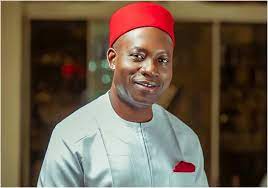Good evening, distinguished Executives and Members of our much cherished Association of Nigerian Authors (ANA). Powerful guardians of the printed word, I salute you all.
It pleases me immensely to be invited to serve as the Guest Speaker of your association's 41st International Convention under the cardinal theme: "Literature and National Consciousness: The Story as a Catalyst."
It is quite deserving to give you, our dear writers, your dues from the very beginning by stating that with the weapon of words, writers have defeated emperors from the beginning of time. The creative artist, alive to his craft, almost always has the last word in the march of civilization and history. As the founder of your association China Achebe wrote in his last novel, Anthills of the Savannah, what survives after the epic battle is the story.
It was back in 1981 that Achebe initiated the birth of ANA at the University of Nigeria, Nsukka, where I was then a young student. Who would have projected that the small acorn birthed by Achebe back then would grow over the years into the mighty oak of today?
Creating a platform for the bearers of the many stories of the epochs has proven to be a splendid inter-generational statement.
Writing happens to be the loneliest of vocations, and writers all over the world do not have sterling qualities of communal bonding and leadership. It is always a war getting the writer out of his lonely hermitage to enjoy togetherness with others. That ANA has survived through the years is a salute to the courage and doggedness of you all. Once again, I salute you all, executives and members of ANA, for giving voice to the voiceless, and lending meaning to a polity that others would have scoffed at.
It needs to be stressed that Achebe was not just a writer. He was at once also a critic, activist, organizer, publisher, politician, and an uncommon leader who served as the President General of his native Ogidi Town Union in Anambra State. Let us not forget that he was the Vice-Chairman to Aminu Kano's Peoples Redemption Party (PRP) of the Second Republic.
A man of unshakable principles, Achebe rejected the award of the high national honour of Commander of the Order of the Federal Republic (CF) in October, 2004 by writing back to the government thus: I write this letter with a very heavy heart. For some time now, I have watched events in Nigeria with alarm and dismay. I have watched particularly the chaos in my own state of Anambra where a small clique of renegades, openly boasting its connection in high places, seems determined to turn my homeland into a bankrupt and lawless fiefdom. I am appalled by the brazenness of this clique and the silence, if not connivance, of the Presidency'. Achebe also rejected the award when it was re-offered in 2011.
If he were to be alive today, and seeing the dire circumstances of the country, he would have made his word count as he did in his 1983 classic book The Trouble with Nigeria that began with these famous damning words: 'The trouble with Nigeria is simply and squarely a failure of leadership. There is nothing basically wrong with the Nigerian character. There is nothing wrong with the Nigerian land or climate or water or air or anything else. The Nigerian problem is the unwillingness or inability of its leaders to rise to the responsibility, to the challenge of personal example which are the hallmarks of true leadership'.
It is this challenge of leadership that is germane to our subject today on the Nigerian nation's economy in a state of critical ferment. Bill Clinton's ace strategist, James Carville, in the 1992 American presidential election coined the phrase: 'It's the economy, stupid!'
The economy is at the root of the well-being of any nation. It is necessary to undertake a cause of disruptive change to get the economy moving in the right direction.
When I was appointed the Governor of the Central Bank of Nigeria
(CBN) in June 2004, I told myself that the old order had to change no matter the challenges on the way. I was barely a month in office when I met with the Bankers Committee and released a 13-point agenda designed to turn around the financial sector of the country. The feather on the crown was of course the banking consolidation initiative. Before consolidation, all the banks in existence in Nigeria put together could not match one South African bank. The recapitalization initiative led to the making of 24 big banks out of the 89 banks previously in existence in the country.
I feel gratified that through our initiative Nigerian banks have been able to go global. The banks opened up offshore branches, thus Becoming truly global players in the financial world. New York, Paris. London, and sundry capitals of African countries now count Nigerian banks among the top players.
It took courage to make all the banks adopt a common year-end policy, thus stopping the hanky-panky of banks cooking their books. My team and I ensured that the banks must undertake a strict observance of sound corporate governance. We were duty-bound to put on sound footing macroeconomic stability. Through our efforts, foreign investment found pride of place in Nigeria.
In the microfinance sector, some 800-odd microfinance houses were granted licences, spreading across the country thus: Southwest 40.5 percent, Southeast 21.2 percent, South-south 14.3 percent, North-central 12.9 percent, Northwest 6.9 percent, and Northeast 4.1 percent. The micro-finance houses were meant to carter to the needs of petty traders, transporters, barbers, local farmers etc.
It was also through our drive that Automatic Teller Machines (ATMs) became a fact of daily Nigerian life.
Nigeria's current economic problems such as corruption, unstable policies, poor human development, over-reliance on crude oil that is drying up, lack of economic diversification, low export earnings, insecurity, lack of infrastructure, and lack of interaction between the government and the private sector are not insurmountable. All it will take is the will to apply the right policies.
I strongly believe that if a country like Singapore can survive, Nigeria has no reason not to flourish as a liveable and prosperous nation. As the first leader of Singapore, Lee Kuan Yew, wrote in his great book, From Third World to First: The Singapore Story: 1965-2000, We faced tremendous odds with an improbable chance of survival. Singapore was not a natural country but man-made, a trading post the British had developed into a nodal point in their worldwide maritime empire. We inherited the island without its hinterland, a heart without a body.
Nigeria can make it as a shining light in the comity of nations, and it is incumbent on you, our hardworking writers, to beam the light on what is possible in Nigeria. Nigeria's first president, Dr. Namdi Azikiwe, highlighted the motto: 'Show the light and the people will find the way'.
Nigerian writers are a force to reckon with all over the world through the winning of all the great prizes such as the Nobel Prize, the Man Booker International Prize, the Booker Prize, the Orange Prize, the Caine Prize, and the Commonwealth Prize, etc. As Achebe wrote, it is morning yet on creation day.
As we present the 2022 China Achebe Prize for Literature endowed by the Government of Anambra State, I wish ANA continuous progress in the grand march to make Nigeria a liveable and prosperous nation.
Thank you.

